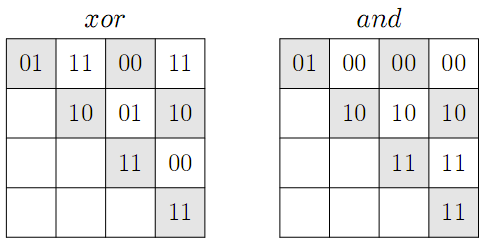 Рабочее место участника
Рабочее место участника
| Выбрать соревнование | Задачи | Послать решение | Результаты проверки | Статистика по задачам | Вопросы и ответы | Результаты соревнования | Состояние сервера | Изменить данные | Управление командой | Помощь |
 Задачи
Задачи
2022. Hack Protection Задачи на идею
Задачи на идеюДеревья (map, set), хэш-таблицы
Олимпиадные задачи на английском языке

| 12/12/2013 | Занятие 12 для продолжающих (Задачи NEERC 2013) (H) |
Ограничения: время – 3s/6s, память – 256MiB Ввод: input.txt или стандартный ввод Вывод: output.txt или стандартный вывод 
Послать решение Blockly Посылки Темы Где Обсудить (0)
Pavel is sending to his friend Egor some array of non-negative integers. He wants to be sure, that nobody
hacks the array before his friend gets it. To solve this problem Pavel need to compute some kind of a
checksum or a digest for his array. Pavel has an innovative mind, so he invents the following algorithm to
compute the digest for his array: count the number of subarrays in which the bitwise xor of the numbers
in the subarray is equal to the bitwise and of the same numbers.
For example, consider an array of four binary numbers "01", "10", "11", and "11". The table below to
the left lists the results of the bitwise xor of numbers for each subarray of this array, and the table below
to the right list the results of the bitwise and of numbers for each subarray of this array. The rows of the
table correspond to the starting elements of the subarray from the 1st element of the array to the 4th
one, while columns correspond to the ending elements of the subarray. Matching values are highlighted
with gray background.

Your task is to help Pavel compute this kind of a digest of the given array.
Input
The first line contains one integer `n` (`1\ ≤\ n\ ≤\ 100\ 000`). The second line contains `n` non-negative integers
`a_i` (`0\ ≤\ a_i\ ≤\ 2^31\ -\ 1`) that are written in decimal notation.
Output
On the first line of the output print Pavel's digest of the given array.
Sample Input
4 1 2 3 3
Sample Output
6
The above sample input corresponds to the example from the problem statement.
Source: ACM ICPC NEERC, 2013 Начало
Начало